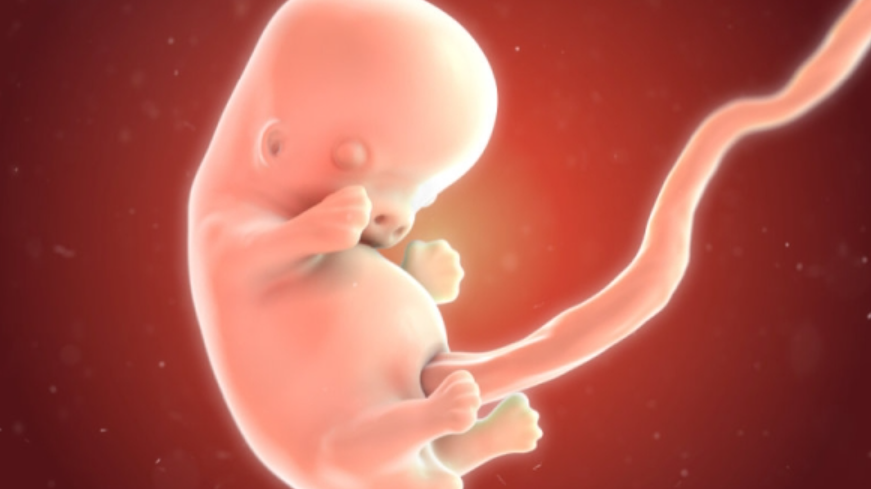Alcohol

Based on what science currently understands about embryology, fetal growth and development, and the breakdown of alcohol, every ounce of alcohol affects the fetus. Therefore, no amount of alcohol can currently be considered safe during pregnancy.
Alcohol’s most well-known effects on a fetus are physical – mostly affecting head and facial development. However, alcohol also negatively influences the brain, which grows the entirety of pregnancy.
What science cannot say, however, is exactly what adverse effects are caused by specific amounts of alcohol, especially low amounts. Some of these cognitive, behavioral, and developmental effects are subtle, and may not be noticed until childhood.
Further, just because science has not identified these adverse affects with low amounts of alcohol does not mean they do not exist.
Alcohol use and its effects on a fetus are notoriously difficult to study due to ethical concerns and variations in women’s metabolisms, timing of exposure, genetics, vulnerabilities, drinking history, and even drinking amount, which is usually underreported. Therefore, studies are not large enough to detect very subtle neurological and behavioral effects on infants and/or children induced by “low” (undefined) amounts of alcohol.
The only way to completely eliminate any potential risk associated with alcohol consumption is to not consume alcohol during pregnancy.
Women should talk to their HCP if they have any questions.
Background
The reported prevalence of alcohol use during pregnancy varies widely, but it is currently estimated 7% to 45% of women consume some amount of alcohol during pregnancy. This wide range is likely due to women underreporting their consumption.
A study published in June 2021 estimated that 54% of pregnancies that result in a live birth in the United States are exposed to alcohol, 12% are ever exposed to ≥5 alcoholic drinks in a week, and 3.0% to ≥9 drinks. Unintended pregnancies (either due to contraceptive failure or sex without contraceptives) account for 80% of pregnancies unknowingly exposed to alcohol.
Current debate surrounding alcohol and pregnancy stems from a perceived lack of evidence that drinking “low amounts” of alcohol during pregnancy has adverse effects. Further, well-publicized headlines of singular studies finding no link has erroneously overpowered the hundreds that show harm.
Pathway to the Fetus
In adults, alcohol is absorbed in the stomach, rapidly distributed throughout the body, then transported to the liver. The liver breaks down about 80% of it to acetaldehyde by the enzyme Alcohol Dehydrogenase (ADH), which is then broken down further by Aldehyde Dehydrogenase (ALDH).
Alcohol can cross the placental barrier into the fetal bloodstream and amniotic fluid:
The fetal liver is not mature enough to convert/metabolize the alcohol; it is also one of the last organs to fully develop. Therefore, the fetus’ blood alcohol content is not only the same as the mother’s, but alcohol remains in the fetal system for much longer. Further, when the fetus urinates into the amniotic fluid, it creates the possibility the fetus will either swallow the alcohol or “breathe” its breakdown components into the liquid-filled lungs.

Current Research
No amount of alcohol has been proven safe at any time during pregnancy.
Of the estimated 1 in 33 babies born in the United States with a birth defect, the most common environmental cause is alcohol.
According to the U.S. National Academy of Medicine, “Of all the substances of abuse (including cocaine, heroin, and marijuana), alcohol produces by far the most serious and irreversible neurobehavioral effects in the fetus.” It has been known for thousands of years that alcohol harms a developing baby, specifically – the central nervous system.
However, science has been unable to consistently and unequivocally show harm from a pregnant woman drinking “low to moderate” amounts of alcohol during pregnancy. Of note, there is no universally accepted definition or limit for what amount of alcohol constitutes “low-to-moderate”.
Further, it is unethical to ask women to drink during pregnancy to better study effects. Therefore, studies are not sufficiently powered to detect small adverse effects on a fetus; these effects are likely developmental, which may not be recognized for years.
Additionally, based on what is known regarding the metabolism of alcohol in both the mother and fetus, and how and when the fetus develops, any amount of alcohol can negatively affect fetal growth and development, the effect of which may be too subtle for current science to identify.

Although publicized research has highlighted a gap regarding low amounts of alcohol on pregnancy outcomes, no published study has been able to show that low amounts of alcohol are risk free. The absence of an identified affect does not mean one does not exist.
Note: This line of thinking does not carry over to medications. Almost no medication is adequately studied during pregnancy, but in some cases they cannot be avoided. Medication has perceived and documented health benefits that, in some cases, can override potential unknown risk; alcohol does not carry these same health benefits.
Further, even if ethical issues were overcome, factors such as amount of alcohol, pattern and timing of exposure, genetics, whether the mother also smoked and/or used other drugs, general health and nutrition of the mother, her level of stress and/or trauma, and her age all may play a role in the impact that alcohol has on the developing fetus.
Women also have very different vulnerabilities to alcohol; one woman may be able to drink a certain amount with no consequences, while another woman can drink the same amount resulting in more severe consequences during pregnancy.
Therefore, the minimum amount of alcohol in which negative affects may start to develop is not known.
Most international organizations around the world recommend that pregnant women avoid all alcohol during pregnancy. Although some guidelines have relaxed in recent years to include lines such as, “if you are going to drink, drink no more than…”, most have reverted back to “no amount of alcohol is known to be safe” and the “best option is avoid alcohol completely” which is the only way to eliminate alcohol-related risk.
Fetal Effects
Overall, alcohol consumption during pregnancy has been linked to miscarriage, birth defects, developmental disabilities and delays, preterm delivery, hearing and vision problems, and complications with heart rate, breathing, sleeping, and digestion in infancy. Most importantly, these effects are irreversible; further, some of these effects have been found at low levels of consumption.
Trying to conceive: A study published in June 2021 determined that moderate to heavy drinking during the luteal phase of the menstrual cycle, and heavy drinking in the ovulatory window, could disturb the delicate sequence of hormonal events, affecting chances of a successful conception.
Fertilization and implantation: Additionally, it is possible that alcohol consumption around the time of fertilization or implantation could cause miscarriage, and several studies have found an association of alcohol and miscarriage even at low amounts of consumption. However, since miscarriage is very common, it is difficult to determine the rate at which alcohol may cause miscarriage.
First trimester: A study from June 2020 determined that alcohol use 5 to 10 weeks from a woman's last menstrual period was associated with an increased risk of miscarriage which peaked at week 9. Further, each successive week of alcohol use was associated with an 8% cumulative increase in miscarriage risk compared to those who did not drink.
Fetal Alcohol Spectrum Disorders (FASD) is an umbrella term that covers all alcohol-related diagnoses, of which fetal alcohol syndrome is the most severe. These effects may include physical, mental, behavioral, and/or learning disabilities that are irreversible and may last a lifetime.
The first clinical report about Fetal Alcohol Syndrome (FAS) was published in 1968 by Paul Lemoine, a French pediatrician, who noted that some children had common facial features. After interviews with nurses and mothers, he determined all the children’s mothers were “heavy” alcoholics; thousands of studies have been published since, further identifying the significant risks of drinking alcohol during pregnancy.
Studies have also determined that alcohol heavily influences the fetal brain, and therefore not all devastating effects can be “seen”. In 2005 the Office of the U.S. Surgeon General issued a press release stating, “it is estimated that for every child born with FAS, three additional children are born who may not have the physical characteristics of FAS but still experience neurobehavioral deficits resulting from prenatal alcohol exposure that affect learning and behavior".
The fetal brain grows throughout the entirety of pregnancy. The vast majority (over 85%) of children with characteristics or disabilities from prenatal alcohol exposure have no physical birth defects, only cognitive, behavioral, and developmental details and complications.
Possible diagnoses within the spectrum include:
Fetal Alcohol Syndrome
Partial Fetal Alcohol Syndrome
Alcohol-Related Neurodevelopmental Disorder
Static Encephalopathy/Alcohol Exposed
Neurobehavioral Disorder/Alcohol Exposed
The prevalence of the full spectrum of FASD in the general population is estimated at 9.1 per 1,000 to 50 in 1,000 live births.
Binge drinking during pregnancy increases the chances of having a baby with FASD (four or more drinks within 2 to 3 hours).

Children with FASDs might have the following characteristics and behaviors:
Abnormal facial features, such as a smooth ridge between the nose and upper lip
Small head size
Short nose
Shorter-than-average height
Low body weight
Developmental effects include:
Poor coordination
Hyperactive behavior
Difficulty with attention
Memory problems
Learning disabilities
Speech and language delays
Intellectual disability or low IQ
Poor reasoning, judgment, and social skills
Sleep and sucking problems as a baby
Hearing of vision problems
Problems with the heart, kidneys, bones, and joints
Recognition of these signs, both physical and developmental, are critical as an early diagnosis can help improve some of the skills that could be damaged; most of these skills are “laid during the first four years of life".
Action
No amount of alcohol has been deemed safe during pregnancy, as all alcohol affects the fetus. Since there are no known benefits of alcohol, it is currently assessed that even small or "low" amounts of alcohol could produce adverse neurological consequences that are just too small or subtle for science to currently identify.
Women should avoid drinking alcohol during pregnancy. If women have any questions or concerns about alcohol consumption during pregnancy, or their past alcohol consumption, they should talk to their HCP.
Partners/Support
Partners and family members of pregnant women should read the above and understand why no amount of alcohol can be considered safe during pregnancy.
Although several articles in the last few years have been published indicating no harm was identified with low amounts of alcohol, the overarching analysis is very nuanced, the limitations are many, and studying the affects of alcohol on a fetus with low consumption of alcohol is very difficult to assess.
Partners/Support can help women avoid alcohol by avoiding alcohol themselves, avoiding placing the woman in a situation where it may be harder for her to say no, and by supporting her desire to abstain from alcohol for the entirety of her pregnancy.
Further, a study published in May 2021 showed that partner influence is an important contributor to prenatal alcohol use, underscoring the influence partners can have on helping their pregnant partners avoid alcohol.
Resources
For more information related to alcohol and pregnancy:
Alcohol and Pregnancy (U.S. Centers for Disease Control and Prevention)
Alcohol and Women (American College of Obstetricians and Gynecologists)
At-Risk Drinking and Alcohol Dependence: Obstetric and Gynecologic Implications (American College of Obstetricians and Gynecologists)
Tobacco, Alcohol, Drugs, and Pregnancy (American College of Obstetricians and Gynecologists)
Alcohol and pregnancy (Royal College of Obstetricians and Gynaecologists)
For resources to help quit drinking:
Women should talk to their HCP about alcohol treatment programs.
National Council on Alcoholism and Drug Dependence (also called NCADD) website, or call 1- 800 622-2255.
Substance Abuse Treatment Facility Locator on the Substance Abuse and Mental Health Services Administration (also called SAMHSA) website or call 1-800 662-4357; helps individuals find drug and alcohol treatment programs in their area.
FAS resources: The FAS/FAE Information Service has a bilingual website and telephone service that provides links to support groups, prevention projects, resource centers and experts on fetal alcohol syndrome and fetal alcohol effects in Canada. English website; French website; or telephone 1-800-559-4514.
Alcoholics Anonymous (A.A.) Alcoholics Anonymous® is a fellowship of men and women who share their experience, strength and hope with each other that they may solve their common problem and help others to recover from alcoholism. Locate an A.A. program
National Organization on Fetal Alcohol Syndrome (NOFAS) or call 800–66–NOFAS (66327)
United Kingdom: Drinkline is the national alcohol helpline: If women are worried about their drinking, they can call this free helpline, in complete confidence; 0300 123 1110 (weekdays 9 am to 8 pm, or weekends 11 am to 4 pm)
NOFAS-UK (National Organisation for Foetal Alcohol Syndrome-UK)